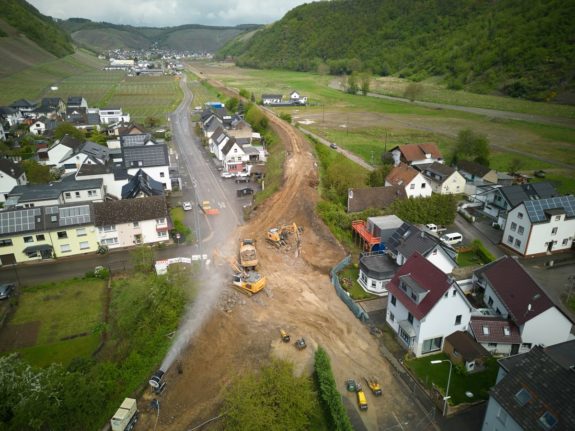The public prosecutor’s office in Koblenz has closed the investigation into the deadly flood disaster in the Ahr valley that occurred in the summer of 2021.
A sufficient suspicion against the former Ahr district administrator Jürgen Pföhler (CDU) and an employee from the crisis team has not arisen, announced the head of the public prosecutor’s office in Koblenz, Mario Mannweiler, on Thursday.
Following the flood disaster in the Ahr region in Rhineland-Palatinate – in which 136 people died in Germany and thousands of homes were destroyed – there were accusations that the district of Ahrweiler, with Pföhler at the helm, had acted too late in sending flood warnings.
An investigation on suspicion of negligent homicide in 135 cases began in August of 2021. Pföhler had always denied the allegations.
READ ALSO: UPDATE – German prosecutors consider manslaughter probe into deadly floods
The public prosecutor’s office came to the conclusion that it was an extraordinary natural disaster: “The 2021 flood far exceeded anything people had experienced before and was subjectively unimaginable for residents, those affected, emergency services and those responsible for operations alike,” the authority said.
Civil protections in the district of Ahrweiler, including its disaster warning system, were found to be insufficient.
READ ALSO: Germany knew its disaster warning system wasn’t good enough – why wasn’t it improved?
But from the point of view of the public prosecutor’s office, these “quite considerable deficiencies”, which were identified by an expert, did not constitute criminal liability.
Why did the case take so long?
The investigations had dragged on partly because they were marked by considerable challenges, said the head of the Rhineland-Palatinate State Criminal Police Office, Mario Germano. “Namely, to conduct investigations in an area marked by the natural disaster and partially destroyed. Some of the people we had to interrogate were severely traumatised.”
More than 300 witnesses were heard including firefighters, city workers and those affected by the flood. More than 20 terabytes of digital data had been secured and evaluated, and more than 300 gigabytes were deemed relevant to the proceedings.
Pföhler, who stopped working as the district administrator in August 2021 due to illness, stepped down from the role in October 2021 citing an incapacity for duty.
The conclusion of the investigation had been postponed several times, in part because the public prosecutor’s office wanted to wait for the outcome of the investigative committee in the Rhineland-Palatinate state parliament.
READ ALSO: Volunteer army rebuilds Germany’s flood-stricken towns




 Please whitelist us to continue reading.
Please whitelist us to continue reading.
Member comments